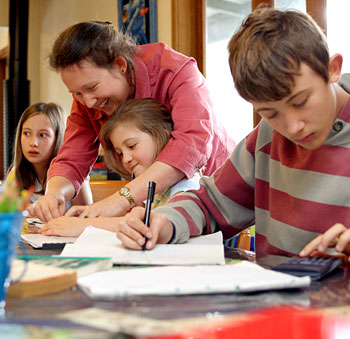Psychology of Homeschool Piano

The psychology of homeschool piano is largely a sensible attitude. I suggest that you try a very child-friendly method to start your homeschool piano program. Any method that does not confuse or rush the child will work. I've worked as a private piano teacher for numerous homeschool families and enjoy the relaxed, creative atmosphere.
Remember that your first objective is to get your child interested in the piano and music in general. Unearthing historic talent and achieving greatness are not on the agenda. Homeschool kids are generally not used to being forced to study. It is refreshing to teach kids who are not working the public school treadmill.
Piano Is Easy
Forced Practice Won't Make You Love The Piano
First recognize that the old method of forced practice doesn’t work. Only a once-every-two-centuries genius like Beethoven could stand and survive forced practicing. Don’t expect it of your child.
Allow them the room and time to demonstrate their own brand of interest. You’ll do better to let the structure be rather loose at first.
Add The Listening Game
Before you ever touch the piano you should begin by playing CDs of famous pianists. You can get rather long excerpts of classical CDs at amazon.com. Just go to amazon and search, for example, “Vladimir Horowitz,” and you will find dozens of CDs with audio samples. Or visit our online listening library.
You need to set the mood that only classical piano music (or something meditative) can set. The mood you are looking for is thoughtful, quiet, yet full of life. Most kids will appreciate the chance to sit quietly with you. It's a special time where you can both listen and not be distracted.
It could be another style, jazz or pop, I’m just suggesting that as an introduction, something thoughtful might be appropriate.
Any Piano Will Do
If you can find a real piano for your lessons, it is better than an electronic one. But if an electronic is all you have it will do just fine. Kids won't know the difference. Put the instrument at the center of attention. Try the living room or family room, or a room that has the greatest amount of people traveling through it.
The reason for this is that kids will play little bits of songs as they pass by, a habit you want to encourage. I’ve seen the greatest success with families that put the piano in the kitchen, or an adjoining type of room, where everybody always goes.
Don't Put The Piano In A Lonely Room
Don’t make the piano be put aside in some special room where the child must go and practice. All children respond to the idea of a piano as a piece of “social furniture.” To kids, the piano is a box that makes pleasant sounds and is sought out like a toy.
Make The Kid A Tinkerer
Kids want to show you what they can do with the piano, that’s why they offer to play it for you. They want to make you proud more than anything. Your first objective is to turn your child into a “tinkerer,” as I call it.
That's a child who likes to fool around with the patterns found in the piano keys. This casual interest in the beginning will turn into major engagement with time, so allow the magic to happen.
Start Playing Yourself
One way to make sure that it begins is to try it yourself. Go to the piano and try to play a song from an easy method such a Piano by Number. Anyone can do this with no musical training or talent at all.
If your child sees you struggling to make music but enjoying it, they will try. One of the best things about this method is the parent’s report that their child is teaching them, the parents.
Let The Child Be Your Teacher
Once the child has decided that the piano is not so very hard, they will give it a try. It may take several months, but let them have this space to learn “Jingle Bells” and “Scooby Doo,” and a dozen more songs by ear. Relieve them of the worry of juggling all the elements that traditionally go into beginning piano lessons.
There's no hurry to begin reading music. You’ll get a thousand times further by engaging the sincere interest of your child, on any level, before you go much deeper into the piano. An enthusiastic start leads to further interest at the piano.
REFERENCES
Homeschool
The Dangers Of Teaching Piano To Your Own Child
Teach Your Toddler Piano
Are You Your Child’s Best First Piano Teacher?
Teach Piano To Your Children
Making Homeschool Piano Work
Homeschool Piano By Number




